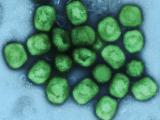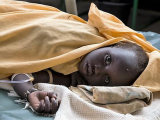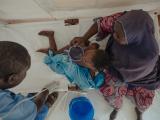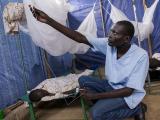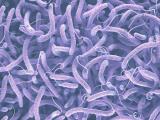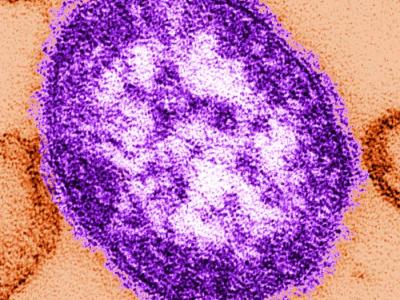Mar 13, 2012
Herbal extract may help treat poxvirus infections, study finds
A laboratory cell-culture study suggests that a plant extract used by 19th century Native Americans to treat smallpox may be helpful in reducing the effects of orthopox virus infections, according to a PLoS One study. Historical accounts say that various East Coast tribes successfully used the carnivorous plant Sarracenia purpurea to treat smallpox victims, according to the report. The scientists used rabbit kidney cell cultures to test the effects of S purpurea extract against vaccinia (VACV), monkeypox (MPXV), and variola viruses (VARV), along with several other viruses. They found that the extract inhibited poxvirus replication at the level of early viral transcription. Also, they determined that the plant's effects were "at least partially specific" to poxviruses in comparison to other unrelated viruses tested. "Our data supports that extracts of S. purpurea effectively inhibit the replication of
VACV, MPXV and VARV in vitro," the report says. "This activity toward Orthopoxviruses is consistent with the historical reports of S. purpurea as a therapy against smallpox infections." The authors include researchers from Arizona State University and the Southwest College of Naturopathic Medicine, both in Tempe, Ariz.; Herbal Vitality Inc., Sedona, Ariz., and the US Centers for Disease Control and Prevention. (The role of Herbal Vitality was limited to providing botanical extracts for the research, the report says.)
Mar 9 PLoS One study
Glitches stall Haiti's cholera vaccination drive on eve of launch
A combination of political complications and a misleading radio news report has stalled a cholera vaccination demonstration project in Haiti just as health workers were preparing to administer the vaccine to 100,000 people, National Public Radio (NPR) reported today. The project was supposed to begin this week in target groups in Port-au-Prince and a rice-growing area along the Artibonite River about 50 miles north of the capital. But the drive was abruptly stopped when a Port-au-Prince radio station said the campaign was "a medical experiment on the Haitian people." The report, which Haiti's Ministry of Health is scrambling to counter, apparently stemmed from a mix-up that occurred during last year's change of government. The previous government opposed cholera vaccination on grounds that it might weaken cholera treatment efforts and fuel resentments because of the very limited supply of vaccine. The country's new
president, Michel Martelly, supports vaccination, and his administration approved the campaign in December. But the two medical groups sponsoring the effort submitted their proposal to the previous government, and the vaccine had not been certified by the World Health Organization at the time. The government deemed the vaccine "experimental" and referred the vaccination proposals to the National Ethics Committee, "where they sat, apparently ignored, until the recent radio report woke everyone up," the story said. The sponsoring groups submitted new proposals to the ethics panel yesterday, and they hope for speedy approval, because the April rainy season may spur cholera outbreaks.
Mar 13 NPR story
Study: Hand disinfection doesn't prevent rhinovirus infection
Hand disinfection in a natural setting didn't significantly reduce rhinovirus infections when compared with normal hand washing routines, according to a study in a college student population. The findings, by a research group from the University of Virginia, run counter to experimental trials of rhinovirus transmission and hand disinfectant use. The 9-week trial took place in the fall of 2009. Of the 212 participants, 116 were randomized to the antiviral hand treatment that contained 2% citric acid and 2% malic acid in 62% ethanol and 96 were in the no-treatment control group. The treatment volunteers applied the lotion every 3 hours while they were awake, and all participants kept daily symptom diaries and had weekly nasal lavage. Those who got sick underwent two additional lavages. Though the hand treatment did not reduce rhinovirus infections or related illnesses, it did lower the number of illnesses in the
intention-to-treat analysis. The researchers said the difference between patterns seen in experimental and natural settings might result from conditions that can't be replicated in the natural setting, such as exposure to the virus in a liquid medium. They added that nasal secretions in a natural setting may have protected the virus from the hand treatment. Also, the group suggested that other routes of transmission besides direct-contact self-inoculation may play a role in the natural setting.
Mar 12 Clin Infect Dis abstract

